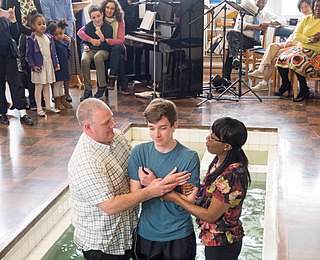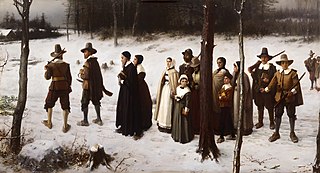Related Research Articles

The Christian Church is a mainline Protestant Christian denomination in the United States and Canada. The denomination started with the Restoration Movement during the Second Great Awakening, first existing during the 19th century as a loose association of churches working towards Christian unity, then slowly forming quasi-denominational structures through missionary societies, regional associations, and an international convention. In 1968, the Disciples of Christ officially adopted a denominational structure at which time a group of churches left to remain nondenominational.

Unitarian Universalist Association (UUA) is a liberal religious association of Unitarian Universalist congregations. It was formed in 1961 by the consolidation of the American Unitarian Association and the Universalist Church of America, both Protestant Christian denominations with Unitarian and Universalist doctrines, respectively. However, modern Unitarian Universalists see themselves as a separate religion with its own beliefs and affinities. They define themselves as non-creedal, and draw wisdom from various religions and philosophies, including humanism, pantheism, Christianity, Hinduism, Buddhism, Taoism, Judaism, Islam, and Earth-centered spirituality. Thus, the UUA is a syncretistic religious group with liberal leanings.

Unitarian Universalism (UU) is a liberal religion characterized by a "free and responsible search for truth and meaning." Unitarian Universalists assert no creed, but instead are unified by their shared search for spiritual growth, guided by a dynamic, "living tradition." Currently, these traditions are summarized by the Six Sources and Seven Principles of Unitarian Universalism, documents recognized by all congregations who choose to be a part of the Unitarian Universalist Association. These documents are "living," meaning always open for revisiting and reworking. Unitarian Universalist (U.U.) congregations include many atheists, agnostics, and theists and have churches, fellowships, congregations, and societies around the world. The roots of Unitarian Universalism are in protestant liberal Christianity, specifically unitarianism and universalism. Unitarian Universalists state that from these traditions comes a deep regard for intellectual freedom and inclusive love. Congregations and members seek inspiration and derive insight from all major world religions.
The Evangelical Lutheran Church in America (ELCA) is a mainline Protestant Lutheran church headquartered in Chicago, Illinois. The ELCA was officially formed on January 1, 1988, by the merging of three Lutheran church bodies. As of 2021, it has approximately 3.04 million baptized members in 8,724 congregations.

The World Evangelical Alliance (WEA) is an interdenominational organization of evangelical Christian churches, serving more than 600 million evangelicals, founded in 1846 in London, England, United Kingdom to unite evangelicals worldwide. WEA is the largest international organization of evangelical churches. The headquarters are in Deerfield, Illinois, with UN offices in New York City, Geneva, and Bonn. It brings together 9 regional and 143 national evangelical alliances of churches, and over one hundred member organizations. Moreover, the WEA includes a certain percentage of individual evangelical Christian churches. As of March 2021, the Secretary General of the WEA is German theologian Thomas Schirrmacher.

The General Association of Regular Baptist Churches (GARBC), established in 1932 is an Independent Baptist Christian denomination in United States, retaining the name "Regular Baptist". The association's home office is located in Arlington Heights, Illinois.

The United American Free Will Baptist Church is the oldest national body of predominantly black Free Will Baptists in the United States.
Nondenominational Christianity consists of churches which typically distance themselves from the confessionalism or creedalism of other Christian communities by not formally aligning with a specific Christian denomination. Many non-denominational churches have a congregationalist polity, which is self-governing without a higher church authority.
The National Council of the Churches of Christ in the USA, usually identified as the National Council of Churches (NCC), is the largest ecumenical body in the United States. NCC is an ecumenical partnership of 38 Christian faith groups in the United States. Its member communions include mainline Protestant, Eastern Orthodox, African-American, evangelical, and historic peace churches. Together, it encompasses more than 100,000 local congregations and 40 million adherents. It began as the Federal Council of Churches in 1908, and expanded through merger with several other ecumenical organizations to become the National Council of Churches in 1950. Its Interim President and General Secretary is Bishop Vashti Murphy McKenzie.
The International Pentecostal Church of Christ is an organization formed in 1976 by the merger of two Pentecostal organizations.
The Evangelical Free Church of America (EFCA) is a denomination in the Evangelical Protestant tradition. The EFCA was formed in 1950 from the merger of the Swedish Evangelical Free Church and the Norwegian-Danish Evangelical Free Church Association.

The Schwenkfelder Church is a small American Christian body rooted in the 16th-century Protestant Reformation teachings of Caspar Schwenkfeld von Ossig (1489–1561).

The mainline Protestant churches are a group of Protestant denominations in the United States that contrast in history and practice with evangelical, fundamentalist, and charismatic Protestant denominations. Some make a distinction between "mainline" and "oldline", with the former referring only to denominational ties and the latter referring to church lineage, prestige and influence. However, this distinction has largely been lost to history and the terms are now nearly synonymous.
The National Association of Congregational Christian Churches (NACCC) is an association of about 400 churches providing fellowship for and services to churches from the Congregational tradition. The Association maintains its national office in Oak Creek, Wisconsin, a suburb of Milwaukee. The body was founded in 1955 by former clergy and laypeople of the Congregational Christian Churches in response to that denomination's pending merger with the Evangelical and Reformed Church to form the United Church of Christ in 1957.

Baptists in the United States make up a large number of all Baptists worldwide. Approximately 11.3% of Americans identify as Baptist, making Baptists the third-largest religious group in the United States, after Roman Catholics and non-denominational Protestants. Baptists adhere to a congregationalist structure, so local church congregations are generally self-regulating and autonomous, meaning that their broadly Christian religious beliefs can and do vary. Baptists make up a significant portion of evangelicals in the United States and approximately one third of all Protestants in the United States. Divisions among Baptists have resulted in numerous Baptist bodies, some with long histories and others more recently organized. There are also many Baptists operating independently or practicing their faith in entirely independent congregations.
The Conservative Congregational Christian Conference is a Congregationalist denomination of Protestant Christianity. It is based in the United States.

Christianity is the most prevalent religion in the United States. Estimates from 2021 suggest that of the entire US population about 63% is Christian. The majority of Christian Americans are Protestant Christians, though there are also significant numbers of American Roman Catholics and other minority Christian denominations such as Latter-day Saints, Orthodox Christians and Jehovah's Witnesses. The United States has the largest Christian population in the world and, more specifically, the largest Protestant population in the world, with nearly 210 million Christians and, as of 2021, over 140 million people affiliated with Protestant churches, although other countries have higher percentages of Christians among their populations. The Public Religion Research Institute's "2020 Census of American Religion", carried out between 2014 and 2020, showed that 70% of Americans identified as Christian during this seven-year interval. In a 2020 survey by the Pew Research Center, 65% of adults in the United States identified themselves as Christians. They were 75% in 2015 70.6% in 2014, 78% in 2012, 81.6% in 2001, and 85% in 1990. About 62% of those polled claim to be members of a church congregation. "In God We Trust" is the modern official motto of the United States, as established in a 1956 law signed by President Dwight D. Eisenhower. The phrase first appeared on U.S. coins in 1864.
Unitarianism, as a Christian denominational family of churches, was first defined in Poland-Lithuania and Transylvania in the late 16th century. It was then further developed in England and America until the early 19th century, although theological ancestors are to be found as far back as the early days of Christianity. It matured and reached its classical form in the middle 19th century. Later historical development has been diverse in different countries.

Protestantism is the largest grouping of Christians in the United States, with its combined denominations collectively comprising about 43% of the country's population in 2019. Other estimates suggest that 48.5% of the U.S. population is Protestant. Simultaneously, this corresponds to around 20% of the world's total Protestant population. The U.S. contains the largest Protestant population of any country in the world. Baptists comprise about one-third of American Protestants. The Southern Baptist Convention is the largest single Protestant denomination in the U.S., comprising one-tenth of American Protestants. Twelve of the original Thirteen Colonies were Protestant, with only Maryland having a sizable Catholic population due to Lord Baltimore's religious tolerance.
References
- ↑ "Church giving drops $1.2 billion reports 2012 Yearbook of Churches". National Council of Churches. March 20, 2012. Retrieved February 24, 2013.